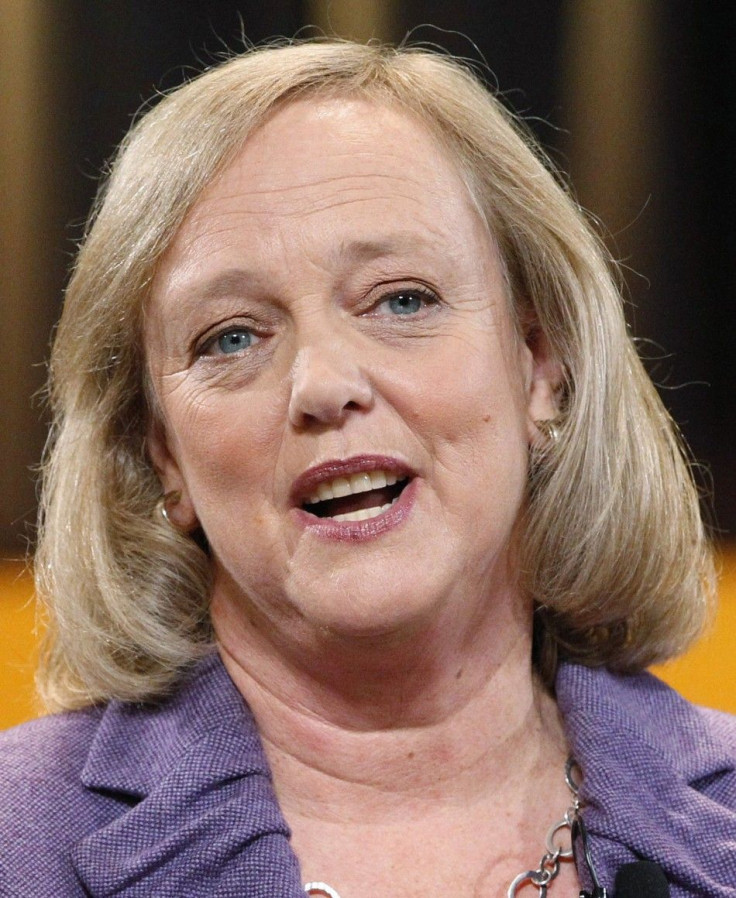Memo From Meg: Top 6 Priorities for Hewlett-Packard

Dear World,
Now that I've been HP's fifth CEO in six years for eight weeks, I'm starting to fill big footprints left by giants like Bill Hewlett, David Packard and John Young.
Lew Platt, who also rose through the ranks, was also a fine CEO. The more recent folks --- Carly Fiorina, Mark Hurd and Leo Apotheker --- are too fresh for judgment.
I'm 55, intelligent and have a good business background, especially making eBay grow into a major e-retailer and auction site. I may have blown $144 million of my own money running as the Republican candidate for Governor of California last year but at least I don't have Jerry Brown's problems now!
Now that we've announced HP's full-year results for 2011, here's what we have to do to get back on course:
Focus on running a united company. The HP I inherited had some great businesses in computing, imaging, printing and services but it didn't look as if they were all well-knit and working together. Now we need to do better, so as to provide a better one-stop-shop to enterprises, compete better against IBM and watch that Apple doesn't start eating away at our place in the PC business. And Larry Ellison at Oracle doesn't beat us in software and analytics
We have to get back to doing what we do really well, I said on the earnings call. Well, we need to coordinate better. Now that I have Ralph Whitworth, an activist shareholder, on my board, someone tough will be looking at me at every directors meeting.
Determine where HP will play in tablets and other new products. We took a huge, $3.3 billion one-time charge, including $1.64 billion to account for the acquisition of Palm. My predecessor botched the HP TouchPad, which was supposed to be the answer to the iPad line.
But we're going to get back into the tablet sector next year relying on Microsoft's Windows 8 OS for tablets.
The numbers make the case: although our Personal Systems Group (the PC line) is the world's largest, growth is negligible. Meanwhile, market researchers like IHSiSuppli predict the tablet sector will skyrocket 245 percent to 60 million units this year, giving Apple a 75 percent share, and to 275 million by 2015.
HP would be crazy not to have a tablet for consumers and corporate buyers. The TouchPad fire sale proved there is demand for a below-$499 tablet. Amazon looks on the way to success with the Kindle Fire.
Tap the smarts of HP Labs. This has been one of HP's closely held secrets for decades, an R&D department focused on new products and mindful of the HP Way's focus on customers first.
HP Labs, under Joel Birnbaum, a former IBM researcher who ran into a brick wall there, helped make HP a computer powerhouse starting around 20 years ago by devising new chip technologies, making HP a workstation giant and ultimately a great computer company. That profoundly changed the company from an instrument and technical products house.
See what's there now, especially new efforts that have been reported, such as magnetic technologies, new computer packaging techniques, software and other middleware services.
HP also needs to keep pouring money into research and development. We spent $3.2 billion last year on it and have the cash to keep doing that for more.
For this, I need to rely on my executive chairman, Ray Lane, because he used to be president of Oracle and understands tech cold.
Determine a solid acquisition strategy. For years, HP grew in part by acquisitions, paying $25 billion for Compaq Computer in 2001 and $10.5 billion for Autonomy this year. Many said we overpaid and some things, like Palm, didn't work out.
Now I've pretty much determined we won't make acquisitions exceeding $1 billion and may only look at something around $500 million for the next year or two. But we need to have a good strategy so as not to pass up the right opportunity, especially with $8.1 billion in cash on hand.
I've promised to deliver a comprehensive strategy in 2012 and takeovers have to be part of it. I already determined it wasn't in our interest to sell or spin off our PC lines.
Implement a succession plan. One of the most embarrassing aspects of my ascension after Leo Apotheker served only 11 months was that HP doesn't seem to have a succession plan. That's a delicate thing to do but it needs to be done right now.
HP needs some stability, so there ought to be discussion who would succeed me if something unexpected happened tomorrow. Great companies have a succession plan.
Maybe HP needs a president. John Young was president before succeeding Bill Hewlett as CEO in 1978. Surely there is an HP veteran who ought to be designated president before the end of 2011.
Make sure I understand the HP Way. Make sure the HP founded in 1939 goes back to the principles of respect, integrity and willingness to accept good ideas from anyone. It also says, We put our customers first in everything we do.
The HP I inherited is different from Lew Platt's company. Instruments are gone with Agilent Technologies. The PC business is now the world's No. 1. There's no more semiconductor business because that's Avago Technologies.
I've already determined today's HP lacks focus and discipline. We need to be simpler, clearer and more consisted I told the investors. But it's my job to get it done.
© Copyright IBTimes 2024. All rights reserved.












